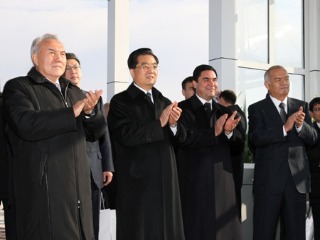Educational Migration from Kazakhstan to China: A Shift Eastward?
By Yelena Sadovskaya (the 30/10/2013 issue of the CACI Analyst)
Over the last ten years, an increasing number of students from Central Asian countries are going to China to study. Kazakhstan ranks first in this list. In the 2003/2004 academic year, only 20 Kazakhstani students obtained education in China under the state student exchange program with Republic of Kazakhstan, while after signing a bilateral agreement on cooperation in 2006, the number of students and trainees – under all kinds of programs (state, corporative and commercial where students pay for themselves), increased several times. According to China’s Ministry of Education, in 2010 as many as 7,874 Kazakhstani students were getting education in China and 1,500 Chinese students in Kazakhstan.
“CACI Analyst, October 16, 2013”
A Chinese Marshall Plan for Central Asia?
By Temuri Yakobashvili (the 16/10/2013 issue of the CACI Analyst)
Twenty years after establishing diplomatic relations with the Central Asia states, China’s economic engagement in the region has expanded to billions of dollars in investments, loans, and energy sales. President Xi Jinping’s September tour concluded with extended aid sums reminiscent of the Marshall Plan. Agreements focused on the fields of energy, trade and finance, and infrastructure, cementing China’s role as Central Asia’s primary economic benefactor. China continues to outpace Russia in both bilateral trade and foreign direct investment measures, though President Xi Jinping is careful not to challenge Russian political primacy in the region. China’s contributions to Central Asia should not discourage the West from participating in regional integration projects and enjoying the rewards.

Turkmenistan, China Reach New Energy Deals
By Tavus Rejepova (the 16/10/2013 issue of the CACI Analyst)
Turkmen and Chinese energy officials, in the presence of Turkmenistan's and China's Presidents Gurbanguly Berdimuhamedov and Xi Jinping, signed a number of new agreements and contracts on September 3-4 on the development of Turkmenistan's giant Galkynysh (Renaissance) gas field and to increase the supply of Turkmen gas to China to 65 billion cubic meters (bcm) per year by 2020. A total of thirteen bilateral documents including the energy sector deals were signed to bring the Turkmen-Chinese cooperation to a new strategic level.


